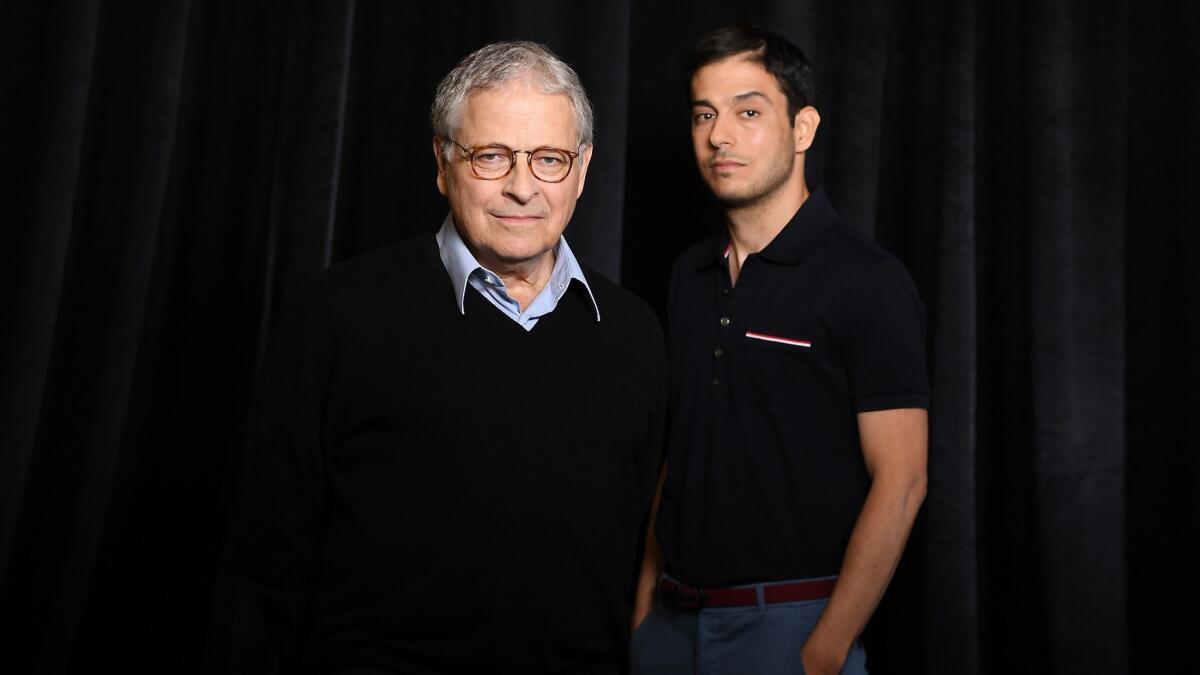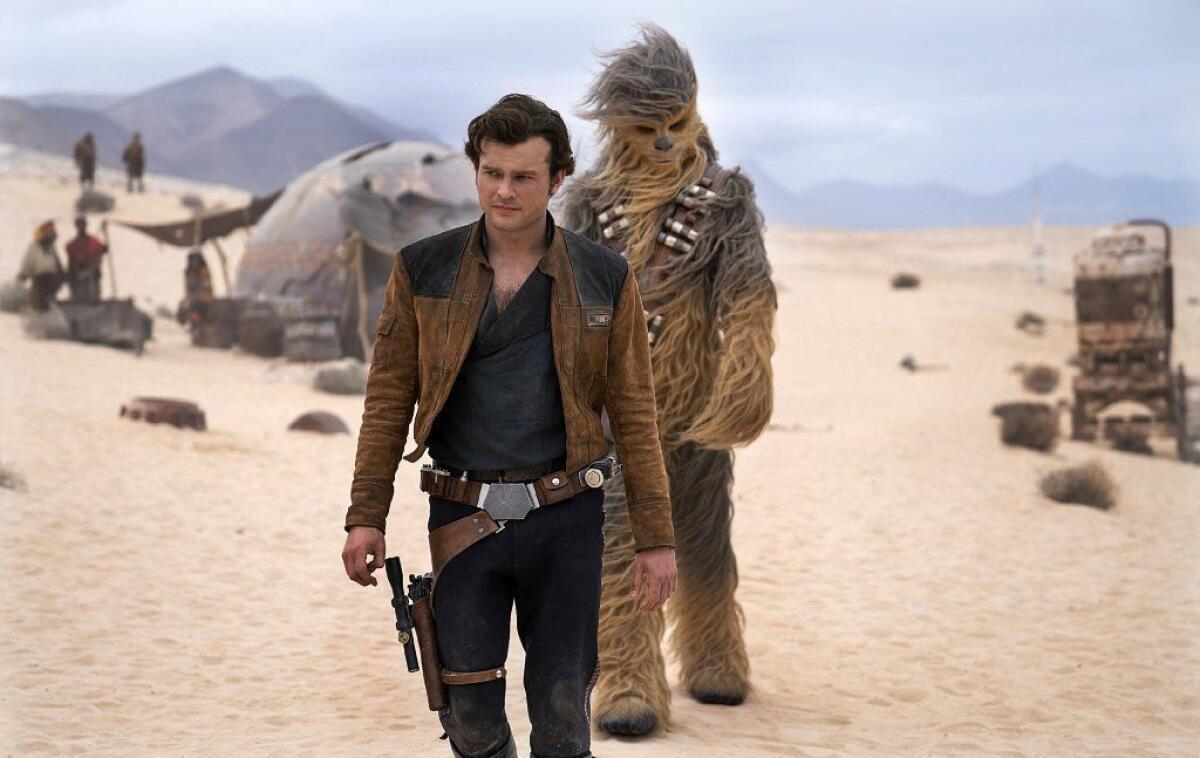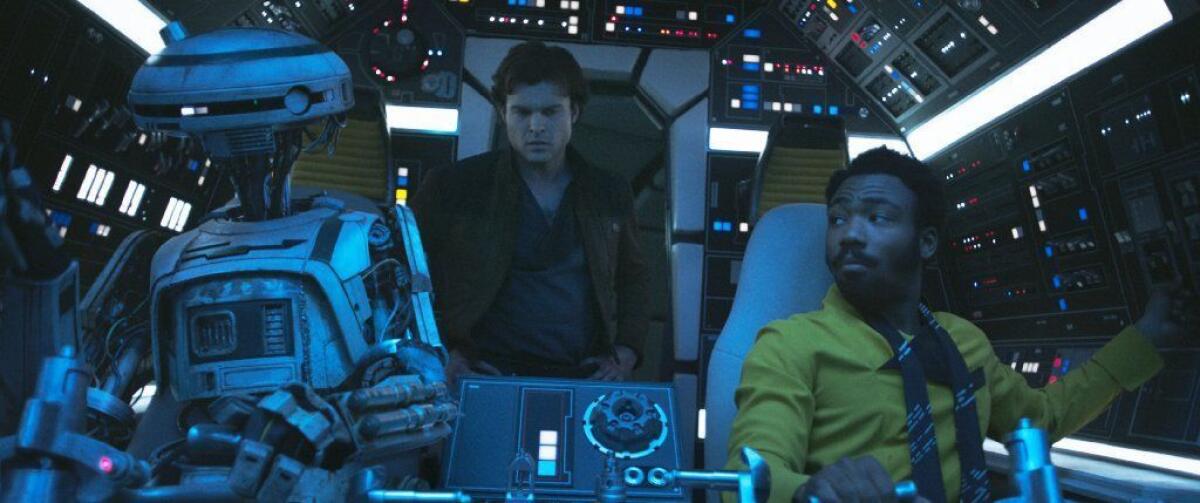‘Solo: A Star Wars Story’ writers Lawrence and Jonathan Kasdan on spoilers, sequels and why Han shot first

- Share via
Warning: This story contains major plot spoilers about “Solo: A Star Wars Story.”
Lawrence Kasdan is an Obi-Wan-like figure in the “Star Wars” universe, having worked on the screenplays for “The Empire Strikes Back,” “Return of the Jedi” and, later, “The Force Awakens.” So when Lucasfilm first began exploring the idea of a spinoff film centered on a young Han Solo, he was the first person they called.
In turn, the first person the 69-year-old Kasdan called to help him crack the script was his son, Jonathan, 38, a writer and director in his own right who had grown up immersed in all things “Star Wars.”
With “Solo: A Star Wars Story” — directed by Ron Howard and starring Alden Ehrenreich as the rakish smuggler — now playing across the country, The Times sat down with the father-and-son team to talk about the enduring appeal of the Solo character, the project’s bumpy history, the surprising appearance of a once-dead villain and why Han most definitely shot first.

When you were first approached about five years ago with the idea for this project, was there anything more to it at that point than “young Han Solo”?
Lawrence: No, that was it. I was reluctant to do anything, but Han is my favorite character so I said, “Hmm.” But I was given total, complete free reign to do whatever I wanted to with Han.
Back when you were working on “The Empire Strikes Back” and “Return of the Jedi,” had you ever given much thought to what Han’s backstory might have been?
Lawrence: No. To me, all character writing is you take a little DNA and you project what the rest of that person is, what shaped him. And the DNA of Han is in the cantina scene [in 1977’s “A New Hope”]. What excited me about Han starts right at that scene. He’s a full character who wanders into this movie and he’s all these things — and it’s all conveyed in, like, two and a half minutes. Even his relationship with Chewie is in that tiny little moment.
Jonathan: If you dig deep enough, George [Lucas] has given reams of discussion on every topic, and some of it is really interesting and cool — and some of it found its way into the movies that Larry wrote back in the ’80s in such elegant ways. “I won her from you fair and square” is just a great line that implies all this stuff. So we knew we were going to be totally faithful to what of the backstory we knew but, more important, design “Solo” like a western or a crime movie.
This movie isn’t a conventional origin story in the sense that we’ve come to expect from superhero movies. When we meet Han, he’s already well on his way to being the guy we will meet in “A New Hope.”
Lawrence: Right. He’s not a baby, but he hasn’t been formed — and he’s going to continue to be formed right up until he falls off the bridge in “The Force Awakens.” [Director Akira] Kurosawa said the villains are completely formed; the heroes are evolving. And Han is a real hero.
When Phil Lord and Chris Miller were initially announced as the directors of “Solo,” a lot of fans took that as a sign that this would be the first full-on “Star Wars” comedy, sort of a “21 Jump Street” in space. Was that ever actually on the table?
Lawrence: I didn’t see it that way because they committed to our script.
Jonathan: They didn’t see it that way either — and I think if they were in the room with us now they would adamantly say that was never their intention. That wasn’t the movie they were making.
The reason we were excited about them, and the reason they were a great fit for this, is that they were both incredibly funny and they had this visual inventiveness that you see in “The Lego Movie.” The comic ideas in the images were so clear that it felt like a great marriage to us with this character. And what they did bring to the movie is very real and very palpable in a lot of the sense of humor and the aesthetic. And Larry is in there just as much, and there’s me too and Ron. It’s really the five of us having created the sound of this particular one.
With everything that was reported about their replacement by Ron Howard, some fans will inevitably watch the movie and try to figure out who did what.
Jonathan: That’s one of the myriad things that’s so hard about a situation like this is that any reporting surrounding it is going to be wrong. Particularly when you get blind sources and it’s an actor on the set or something — that’s just not someone who has the access to have seen what went down in any kind of way. And the five or six people who did were not talking to anybody in that kind of detail. So you find yourself in the unenviable position of sort of relating to Trump where you’re like, “Oh, I get what he means when he says ‘fake news.’ ” [laughs]
Lawrence: [dryly] I can’t get that far. My brother used to say, “I’m going to tell you something, but it’s oversimplified and therefore false” — and that’s stuck with me my whole life. You understand why things are reported that way, but you don’t accept it as being the truth.
At the end of this movie, Han shoots Beckett first, which a lot of fans will take as a nod to the fact that Han originally shot Greedo first in “A New Hope” before Lucas changed it in a later “special edition” re-release. How important was that moment to you?
Lawrence: It’s very important for me. It’s one of the few things that I just wanted resolved. And Jon was with me 100%. Because it’s the way it was.
Jonathan: It’s such an important thing about the character: This is a guy who lives in a world where you need to be able to do that. The thing about “Han shot first” speaks directly to the moral ambiguity element. We wanted to make a “Star Wars” movie that existed in a universe where Han could shoot first and where characters didn’t have to be all good and all bad.
Lawrence: Which is really the one that George created and had second thoughts about.
Have you talked to Lucas about that?
Lawrence: Well, he loves this movie. He saw it before the premiere, and he has really embraced it.
Jonathan: On one of the first days we were in London when Ron had taken over, George came out to set. He was going to stop by and spend, like, 20 minutes, and he spent, like, four hours. He just loved being there with Ron shooting on the Millennium Falcon. You could see him finding some real pleasure in it again, which was really kind of lovely. He would suggest things and listen to takes. It was a delight.

The appearance of Darth Maul at the end surprised a lot of people who have only seen the “Star Wars” movies because he dies in the prequels. Until I googled it, I didn’t know he’d been brought back in “The Clone Wars” TV series.
Jonathan: Larry was in the same boat.
Lawrence: I was like, “What? I thought he got cut in half! That usually does you in.”
Jonathan: No, it doesn’t, particularly with “Star Wars” technology. [laughs]
The thing I’ll say about it is that he’s a character that, like Darth Vader, worked on a primal level for people. He touches on something fundamental in our psyche, and in those three movies, he, to me, was the most powerful bit of psychological imagery. I think that’s why fans were drawn to him and why the canon was eager to tell more stories about him. In a galaxy populated with very dangerous people, he’s always been in the top group of dangerous people. So the opportunity to put him in the movie and give him the element of these mechanical legs, which rhyme with Luke’s mechanical hand — it seemed like it could work.
This movie definitely leaves some plot threads that could be explored in future sequels. Do you have ideas of where you’d like to see things go from here?
Jonathan: We have thoughts definitely. We wanted to leave it as pregnant with dramatic possibility, and with people that you wanted to see, as it could be. For me, as fun as that Chewie entrance is, I think seeing Han and Chewie with Jabba [the Hutt] could have equal amounts of fun. I would go to that movie in a heartbeat. I was very passionate that it ended with the promise that they’re going to go meet that guy, not because I thought it was a great tease but because I thought Alden as Han was ready for that.
Lawrence: And it’s certainly not the debt that he owes Jabba in “A New Hope.” There’s ten years of business dealings.
Jonathan: It’s going to be a long, complicated relationship between those two guys. And [Emilia Clarke’s] Qi’ra is not done in Han’s life. So yeah, we’d love to tell more stories there.
This interview has been condensed and edited.
Twitter: @joshrottenberg
ALSO
How Paul Bettany sent a text message and became 'Solo: A Star Wars Story's' new villain
Only good movies
Get the Indie Focus newsletter, Mark Olsen's weekly guide to the world of cinema.
You may occasionally receive promotional content from the Los Angeles Times.








